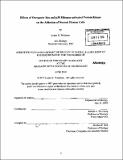Effects of oncogenic Ras and p38 mitogen-activated protein kinase on the adhesion of normal human cells
Author(s)
Waldman, Lynne K
DownloadFull printable version (12.79Mb)
Other Contributors
Massachusetts Institute of Technology. Dept. of Biology.
Advisor
Robert A. Weinberg.
Terms of use
Metadata
Show full item recordAbstract
Activating mutations in RAS oncogenes commonly arise in human cancers. However, in experimental settings, oncogenic RAS has most often been studied at supraphysiological levels of expression. Importantly, work by others showed that the response of murine cells to expression of oncogenic ras from the endogenous promoter is strikingly different from the response of both human and murine cells to high levels of ectopically expressed oncogenic RAS. Thus, to study the outcome of oncogenic Ras signaling in human cells at a more physiological level, I developed a system in which I could activate oncogenic Ras signaling to either low or high extents in normal human fibroblasts. A low level of oncogenic Ras signaling induced cellular hyperproliferation, whereas a high level of signaling induced cellular senescence. A growing body of literature links loss of p38 mitogen-activated protein kinase (MAPK) activity with the promotion of Ras-induced transformation in murine cells. Accordingly, I examined the effect of inhibiting p38 in normal human cells in which I also activated a low level of oncogenic Ras signaling. Interestingly, the inhibition of p38 cooperated with low activation of oncogenic Ras to alter the morphology and adhesive properties of cells. My results suggest that the inhibition of p38 could predispose human cells to partial transformation by oncogenic Ras through alterations in cellular adhesion.
Description
Thesis (Ph. D.)--Massachusetts Institute of Technology, Dept. of Biology, 2010. Vita. Cataloged from PDF version of thesis. Includes bibliographical references.
Date issued
2010Department
Massachusetts Institute of Technology. Department of BiologyPublisher
Massachusetts Institute of Technology
Keywords
Biology.